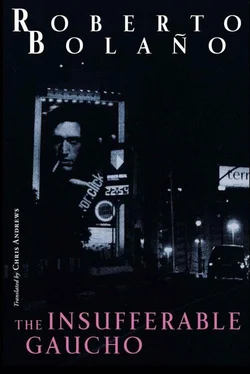Roberto Bolaño
The Insufferable Gaucho
For my children Lautaro and Alexandra
and for my friend Ignacio Echevarría
So perhaps we shall not miss so very much after all.
— Franz Kafka
Many years ago I had a friend named Jim, and he was the saddest North American I’ve ever come across. I’ve seen a lot of desperate men. But never one as sad as Jim. Once he went to Peru — supposedly for more than six months, but it wasn’t long before I saw him again. The Mexican street kids used to ask him, what’s poetry made of, Jim? Listening to them, Jim would stare at the clouds and then he’d start throwing up. Vocabulary, eloquence, the search for truth. Epiphany. Like when you have a vision of the Virgin. He was mugged several times in Central America, which is surprising, because he’d been a Marine and fought in Vietnam. No more fighting, Jim used to say. I’m a poet now, searching for the extraordinary, trying to express it in ordinary, everyday words. So you think there are ordinary, everyday words? I think there are, Jim used to say. His wife was a Chicana poet; every so often she’d threaten to leave him. He showed me a photo of her. She wasn’t especially pretty. Her face betrayed suffering, and under that suffering, simmering rage. I imagined her in an apartment in San Francisco or a house in Los Angeles, with the windows shut and the curtains open, sitting at a table, eating sliced bread and a bowl of green soup. Jim liked dark women, apparently, history’s secret women, he would say, without elaborating. As for me, I liked blondes. Once I saw him watching fire-eaters on a street in Mexico City. I saw him from behind, and I didn’t say hello, but it was obviously Jim. The badly cut hair, the dirty white shirt and the stoop, as if he were still weighed down by his pack. Somehow his neck, his red neck, summoned up the image of a lynching in the country — a landscape in black and white, without billboards or gas station lights — the country as it is or ought to be: one expanse of idle land blurring into the next, brick-walled rooms or bunkers from which we have escaped, standing there, awaiting our return. Jim had his hands in his pockets. The fire-eater was waving his torch and laughing fiercely. His blackened face was ageless: he could have been thirty-five or fifteen. He wasn’t wearing a shirt and there was a vertical scar from his navel to his breastbone. Every so often he’d fill his mouth with flammable liquid and spit out a long snake of fire. The people in the street would watch him for a while, admire his skill, and continue on their way, except for Jim, who remained there on the edge of the sidewalk, stock-still, as if he expected something more from the fire-eater, a tenth signal (having deciphered the usual nine), or as if he’d seen in that discolored face the features of an old friend or of someone he’d killed. I watched him for a good long while. I was eighteen or nineteen at the time and believed I was immortal. If I’d realized that I wasn’t, I would have turned around and walked away. After a while I got tired of looking at Jim’s back and the fire-eater’s grimaces. So I went over and called his name. Jim didn’t seem to hear me. When he turned around I noticed that his face was covered with sweat. He seemed to be feverish, and it took him a while to work out who I was; he greeted me with a nod and then turned back to the fire-eater. Standing beside him, I noticed he was crying. He probably had a fever as well. I also discovered something that surprised me less at the time than it does now, writing this: the fire-eater was performing exclusively for Jim, as if all the other passersby on that corner in Mexico City simply didn’t exist. Sometimes the flames came within a yard of where we were standing. What are you waiting for, I said, you want to get barbecued in the street? It was a stupid wisecrack, I said it without thinking, but then it hit me: that’s exactly what Jim’s waiting for. That year, I seem to remember, there was a song they kept playing in some of the funkier places with a refrain that went, Chingado, hechizado (Fucked up, spellbound) . That was Jim: fucked up and spellbound. Mexico’s spell had bound him and now he was looking his demons right in the face. Let’s get out of here, I said. I also asked him if he was high, or feeling ill. He shook his head. The fire-eater was staring at us. Then, with his cheeks puffed out like Aeolus, the god of the winds, he began to approach us. In a fraction of a second I realized that it wasn’t a gust of wind we’d be getting. Let’s go, I said, and yanked Jim away from the fatal edge of that sidewalk. We took ourselves off down the street toward Reforma, and after a while we went our separate ways. Jim didn’t say a word in all that time. I never saw him again.
In the opinion of those who knew him well, Manuel Pereda had two outstanding virtues: he was a caring and affectionate father, and an irreproachable lawyer with a record of honesty, in a time and place that were hardly conducive to such rectitude. As a result of the first virtue, his son and daughter, Bebe and Cuca, whose childhood and adolescent years had been happy, later accused him of having sheltered them from the hard realities of life, focusing their attack particularly on his handling of practical matters. Of his work as a lawyer, there is little to be said. He prospered and made more friends than enemies, which was no mean feat, and when he had the choice between becoming a judge or a candidate for a political party, he chose the bench without hesitation, although it obviously meant giving up the opportunities for greater financial gain that would have been open to him in politics.
After three years, however, disappointed by his judicial career, he gave up public life and spent some time, perhaps even years, reading and traveling. Naturally there was also a Mrs. Pereda, née Hirschman, with whom the lawyer was, so they say, madly in love. There are photos from the time to prove it: in one of them, Pereda, in a black suit, is dancing a tango with a blonde, almost platinum blonde, woman, who is looking at the camera and smiling, while the lawyer’s eyes remain fixed on her, like the eyes of a sleepwalker or a sheep. Unfortunately, Mrs. Pereda died suddenly, when Cuca was five and Bebe was seven. The young widower never remarried, although there were various women in his social circle with whom he was known to maintain friendly (though never intimate) relations, and who had, moreover, all the qualities required to become the new Mrs. Pereda.
When the lawyer’s two or three close friends asked him why he remained single, his response was always that he didn’t want to impose the unbearable burden (as he put it) of a stepmother on his offspring. In Pereda’s opinion, most of Argentina’s recent problems could be traced back to the figure of the stepmother. As a nation, we never had a mother, he would say, or she was never there, or she left us on the doorstep of the orphanage. But we’ve had plenty of stepmothers, of all sorts, starting with the great Peronist stepmother. And he would conclude: In Latin America, when it comes to stepmothers, we’re the experts.
In spite of everything, his life was happy. It’s hard not to be happy, he used to say, in Buenos Aires, which is a perfect blend of Paris and Berlin, although if you look closely it’s more like a perfect blend of Lyon and Prague. Every day he got up at the same time as his children, had breakfast with them, and dropped them off at school. He spent the rest of the morning reading at least two newspapers; and, after a snack at eleven (consisting basically of cold cuts and sausage on buttered French bread and two or three little glasses of Argentine or Chilean wine, except on special occasions, when the wine was, naturally, French), he took a siesta until one.
Читать дальше












